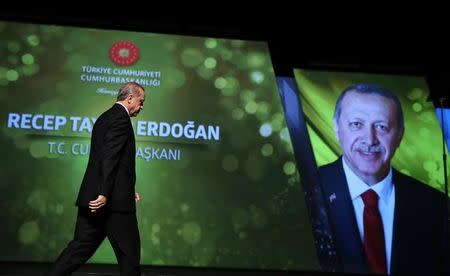Erdogan reaffirms EU membership as Turkey's "strategic goal"

ANKARA (Reuters) - Membership of the European Union remains Turkey's strategic goal and a deal to liberalise visas for Turks visiting the bloc should accelerate the accession process, President Tayyip Erdogan said on Monday. His written statement appeared to be an attempt to clarify Ankara's position days after Erdogan said Turkey would not make changes to its terrorism laws required under a deal with the EU to curb migration, declaring: "we're going our way, you go yours". "EU membership, a strategic goal for Turkey, will be a source of stability and inspiration for the region," Erdogan said in the statement, released to coincide with Europe Day. "I hope that the agreed visa exemption (deal) will relieve some of the frustration caused by more than 50 years of waiting at the EU's gates ... and that it accelerates Turkey's accession process," Erdogan said. The EU has asked member states to grant visa-free travel to Turks in return for Ankara stopping migrants from reaching Europe, but said Turkey still had to change some legislation, including bringing its terrorism laws in line with EU standards. Turkey has repeatedly said that without visa liberalisation, there would be no migrant deal. Concerns are rising in Europe that the deal - which has sharply cut the number of migrants reaching the EU from Turkish shores - may collapse after last week's announcement by Prime Minister Ahmet Davutoglu, the main Turkish broker of the accord, that he will step down amid tensions with Erdogan. "NECESSARY POLICIES" Turkey's foreign ministry spokesman Tanju Bilgic said on Monday that Ankara would develop the "necessary policies" on visa liberalisation with the EU and would implement them in line with Erdogan's recent statements. Erdogan's reaffirmation of Turkey's EU aspirations comes amid growing unease within the 28-nation bloc about what is viewed as the Turkish president's authoritarian style of leadership and his intolerance of media criticism. Two prominent journalists from an opposition Turkish newspaper were jailed last Friday on charges of revealing state secrets in a case in which Erdogan was named as a complainant. However, EU governments' public criticism has been relatively muted because they need Ankara's cooperation on migrants. Turkey began its EU accession talks in 2005 after decades of knocking on the door but progress has been very slow due to a range of issues including its human rights record and Cyprus. (Reporting by Orhan Coskun and Ece Toksabay; Writing by Dasha Afanasieva; Editing by Daren Butler and Gareth Jones)

